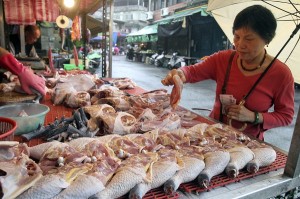Asia on guard as Taiwan reports first bird flu case

A Taiwanese woman buys chicken at a market in Taipei, Taiwan, Thursday, April 25, 2013. Taiwan has confirmed its first case of a new deadly strain of bird flu. The Centers for Disease Control said Wednesday that a 53-year-old man became sick with the H7N9 bird flu virus after returning from a visit to the eastern Chinese province of Jiangsu on April 9. AP PHOTO/CHIANG YING-YING
TAIPEI—Asian countries on Thursday urged renewed vigilance against a spread of H7N9 bird flu after Taiwan reported a case of the deadly strain, the world’s first outside mainland China.
The self-governing island urged its residents to take “enhanced precautions” when visiting China—placing Shanghai, Beijing and five Chinese provinces on particular alert for travelers after at least 22 deaths were confirmed there.
Taiwan’s Centers for Disease Control (CDC) confirmed on Wednesday that a 53-year-old Taiwanese man, who had been working in the eastern Chinese city of Suzhou, showed symptoms three days after returning home via Shanghai on April 9.
The man, who was infected in China, has been hospitalized since April 16 and is in a serious but stable condition, it said.
There have been 111 confirmed cases of human infection with H7N9 avian influenza in China, including the fatalities, figures from Chinese authorities and the World Health Organization show.
The WHO maintained its global advisory for combating the bird flu, urging against contact with live poultry but not recommending any restrictions against travel to China.
The “enhanced precautions” urged by Taiwan’s CDC were in line with WHO advice, counseling people to avoid going to poultry markets, stay away from anyone with a fever and eat only thoroughly cooked bird meat and eggs.
WHO experts said on Wednesday that H7N9 was a particularly lethal influenza virus but that there was no proof yet of sustained transmission between humans.
Chinese researchers reporting in The Lancet on Thursday confirmed poultry as a source of the virus and also said they found no evidence of person-to-person transmission.
Asian nations stressed they had measures in place, pioneered during a deadly outbreak of Severe Acute Respiratory Syndrome (SARS) a decade ago, but appealed to their citizens to heed the WHO guidelines in light of the Taiwan case.
“Our healthcare institutions remain on heightened alert and are prepared for the eventuality of a possible case, especially given today’s globalized travel patterns,” Singapore’s health ministry said in a statement.
Many Asian countries including China’s neighbors Japan and South Korea are anticipating an influx of Chinese tourists during next week over the Labor Day holiday.
Japan’s foreign ministry reissued a travel advisory to citizens planning to visit China or Taiwan, warning them to stay away from bird farms and wear masks in crowded areas.
Reviving a SARS-era precaution, Japan has been checking inbound travelers with body temperature monitors as it gears up for the “Golden Week” spring vacation starting next week.
“We are taking every possible measure just in case,” Chief Cabinet Secretary Yoshihide Suga told reporters on Thursday.
South Korea, Hong Kong and the Philippines have also resumed using thermal scanners at their main ports of entry to detect anyone arriving with a fever.
Municipal authorities in South Korea have designated a network of clinics and hospitals to quickly test and treat potential patients. Teams of cleaners are ensuring that public venues are regularly wiped with disinfectant.
Lyndon Leesuy, the Philippine health department’s manager for emerging diseases, said his own government’s precautions including a ban on Chinese poultry imports were routine.
“We do not want to create panic,” he told AFP.
Taiwan said it was bringing forward plans to ban the killing of live poultry in traditional markets by a month, to May 17.
Under the ban, market vendors will not be allowed to sell birds they have killed themselves, only poultry supplied from Taiwan’s 79 approved slaughterhouses.
There are about 870,000 Taiwanese people living in China. Trade and cross-strait travel have soared in recent years after decades of tension since the two sides split in 1949 at the end of a civil war.—Amber Wang














